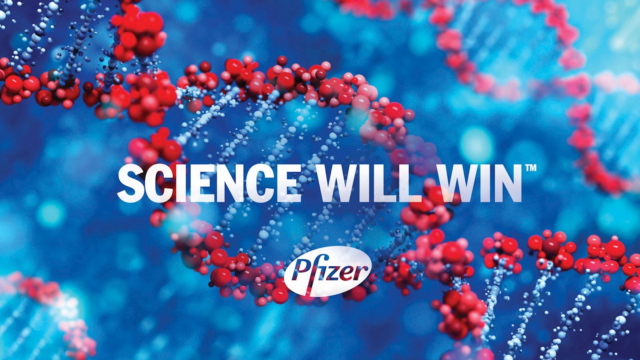Pfizer Super Bowl Ad Debut Fights Cancer With Science and Queen
Announcing! Brandweek is headed to Phoenix, Arizona this September 23–26. Join us there to explore the future of marketing, discover cutting-edge strategies and network with the best in the business.
If you’re Pfizer and you’re dedicating your first Super Bowl ad to fighting cancer, how do you get the message across without bringing down more than 100 million people across the country?
Crank up the Queen.
“One thing we have seen, particularly with our new agency partners at Publicis, is the power of music in creative,” said Drew Panayiotou, Pfizer’s global CMO. “The determination of doctors and researchers in treating patients and fighting cancer, something they often have is this perseverance—this ‘Don’t stop me, I’m going to keep going and find a cure”—and so the music is a great representation of that.”
Pfizer and its creative partners at Publicis Conseil and LeTruc/Publicis NY produced a 60-second ad airing in the third quarter of Super Bowl 58 that picks up Queen’s “Don’t Stop Me Now” and uses it to reanimate the history of science. Those depicted in the portraits, sculptures, paintings, magazine covers, sepia-toned photographs and museum exhibits that begin lip syncing to Freddie Mercury include:
- Sir Isaac Newton
- Archimedes
- Rembrandt van Rijn’s The Anatomy Lesson of Dr. Nicolaes Tulp
- Pfizer founders Charles Pfizer and Charles F. Erhart
- Rosalind Franklin
- Copernicus
- Marie Maynard Daly
- Hippocrates
- Mary Somerville
- Galileo
- Daniel Gabriel Fahrenheit
- Albert Einstein
- Dr. Katalin Karikó
If “Don’t Stop Me Now” could survive a zombie apocalypse, a season of American Idol and use in almond milk, makeup and Amazon 2019 Super Bowl ads, surely it could help viewers get to scenes of a child’s successful cancer treatment—and the prompt for Pfizer’s LetsOutdoCancer.com site. When Pfizer tested the ad with audiences, it landed in the top 25% of all Super Bowl ads aired since 2020 and Top 5 of 1,400 comparable pharmaceutical ads.
“[As] people learned the story and went through our digital experiences, they said it gives them hope that we will find a treatment for cancer,” Panayiotou said. “People said, ‘We now know this is very important for Pfizer’…and that’s why you go to the Super Bowl, to have people understand what the company is about and its future, and why it matters to them.”
Directed by Noam Murro and aided by production agencies Prodigious France, PXP, Le Pac, and Boogie Films and post-production agencies including Le Pac and Mathematic, the ad ostensibly serves as a celebration of Pfizer’s last 175 years. After Pfizer’s roughly $43 billion acquisition of cancer-focused biotechnology company Seagen Inc. and its cancer-cell-killing antibody-drug conjugate, cancer became a Super Bowl-sized priority for the company.
It announced a three-year, $15 million partnership with the American Cancer Society to target breast and prostate cancer in underserved communities. Pfizer said it’s doubling its oncology capacity, developing 50 new programs and 27 new molecular entities, and dedicating roughly 40% of all its research and development to cancer.
Pfizer’s Super Bowl ad debut during a year in which 30-second spots start at roughly $7 million won’t have its return-on-investment measured in sales. But beyond site visits, social media engagement and overall awareness, the company hopes the spot drives increased urgency around cancer throughout its industry.
“Great brands do not always make other communications around ‘Buy something,’” Panayiotou said. “Great brands create movements and, here, we want to create a movement around cancer across the community.”
Even as deaths from cancer in the U.S. have decreased 33% since the 1990s, the American Cancer Society noted that an aging, growing population is leading to a rise in overall diagnoses. Those same factors will yield 28.4 million new cancer cases around the world by 2040, while one in three people in the U.S. will be diagnosed with cancer in their lifetime.
“The ecosystem around a person who gets cancer, the whole family is affected—this is something that affects everyone,” Panayiotou said. “That’s why the Super Bowl matters, because if we deliver what the research has said, which is that this gives people hope and belief on something that affects most everyone, then it’s a successful piece of communication.”
Pfizer and the ad will be featured on CBS’ Good Morning America the Monday after the game, with the spot running on CBS, TikTok, YouTube, Facebook and Instagram through Feb. 16.
For the latest Super Bowl 58 advertising news—who’s in, who’s out, teasers, full ads and more—check out Adweek’s Super Bowl 2024 Ad Tracker and the rest of our stories here. And join us on the evening of Feb. 11 for the best in-game coverage of the commercials.
https://www.adweek.com/brand-marketing/pfizer-super-bowl-ad-cancer-science-queen/
